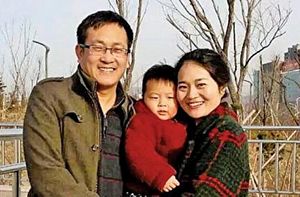The Chinese Communist Party’s apparatus for information control is becoming more technologically sophisticated by the day. But in recent months, security agencies in China also appear to have expanded their influence over internet management, resulting in a wide range of judicial and extralegal penalties imposed on both high-profile activists and ordinary Chinese users who seek to access or share uncensored information. Three key aspects of this phenomenon are worth noting:
Crackdown on Twitter and VPN Users
Due to tight government control over domestic social media platforms, millions of savvy activists and critics of the government have come to rely on the U.S.-based microblogging service Twitter to freely express their opinions and share information. Although Twitter is formally blocked in China, these users reach it with the help of circumvention tools and virtual private networks (VPNs).
In a new trend that emerged toward the end of 2018, security forces across the country are engaged in a coordinated campaign to pressure Twitter users to delete tweets or quit the platform; other users have reported having their accounts hacked and posts removed. According to coverage of the crackdown from the Washington Post on January 4, authorities now see curbing elite internet users’ access to Twitter as a top priority. The campaign has continued in January, with hundreds and possibly thousands of users subjected to harassment, detention, and interrogation.
Those who provide circumvention tools have also increasingly been charged with offenses such as “setting up and using illegal channels to access the international internet,” which had been widely tolerated in the past.
Observers have noted a double standard, given that state media outlets and their employees are highly active on Twitter and other blocked platforms. China-based users who set up their Twitter accounts with non-Chinese email addresses or phone numbers may be safer amid the ongoing crackdown.
Holiday Trials and Sentencing
The Chinese Communist Party has a long tradition of trying and sentencing high-profile activists and journalists during the holiday season around Christmas, when many China watchers and foreign correspondents are on vacation. On December 25, 2018, Sun Lin, who had contributed to the overseas news site Boxun, was found guilty and sentenced to four years in prison for “inciting subversion of state power.” On December 26, Wang Quanzhang, who has been in detention since July 2015 as part of a crackdown on human rights lawyers and advocates, was tried in Tianjin.
Update: On January 28, Wang was sentenced to 4.5 years in prison.
On December 28, the executive director of the online platform Human Rights Campaign in China, Zhen Jianghua, was sentenced to two years for the same charge, having spent the previous six months in detention. Also on December 28, Minsheng Guangcha website editor Ding Lingjie was given 20 months in prison for “picking quarrels and stirring up trouble” after sharing a video that satirized President Xi Jinping.
Prosecutions have continued into the new year. Online dissident and 64 Tianwang website founder Huang Qi stood trial in Sichuan province on January 14 on charges of leaking state secrets. No verdict has yet been released, and according to a leaked censorship directive translated by China Digital Times, any unauthorized coverage of the case has been forbidden. That same day in Shanghai, democracy activist Ji Xiaolong was tried and sentenced to 3.5 years in prison for “picking quarrels and stirring up trouble” after calling on people to write “Down with the CCP” in local public toilets.
Citizens Punished for Communicating About Religious Repression
Religious freedom is one of the most censored topics in Chinese media and online, and several recent cases demonstrate that believers and citizen journalists continue to be arrested, imprisoned, and disappeared for helping to disseminate information on religious persecution. Dozens of reporters for Bitter Winter have been arrested for filming or gathering information on violations of religious freedom and human rights since the authorities reportedly designated the outlet a “foreign hostile website” in August 2018.
On November 4, award-winning photojournalist Lu Guang disappeared while in Xinjiang, where members of the predominantly Muslim Uyghur ethnicity face intense repression. Lu’s wife confirmed on December 11 that he had been arrested. The Committee to Protect Journalists listed 11 journalists detained in China in 2018 and still behind bars as of December — 10 were arrested in Xinjiang, and nine of them are Uyghurs.
Separately, two practitioners of the banned spiritual group Falun Gong, Yang Yueliang and Liu Wenting, were sentenced to three-and-a-half and two-and-a-half years in prison, respectively, in October for installing satellite receivers capable of receiving uncensored overseas media reports, including about religious persecution. And on January 14, at least six Tibetans were arrested for sharing politically sensitive information on WeChat.
During the Lunar New Year that begins next week — the biggest holiday of the Chinese calendar — over a billion people will gather with relatives to enjoy dumplings, lion dances, and sweet red bean soup. But the families of the above activists and others like them will be spending this New Year without their loved ones. Even at such a dark time, however, many of these remarkable individuals and their families remain committed to the cause of freedom.
In the same spirit, when the Year of the Pig begins on February 5, friends and distant supporters can take action by sending letters, donations, and even tweets for the families of China’s beleaguered human rights defenders, journalists, and religious believers. Even such small gestures can be meaningful, showing that their plight, their loved ones, and the worthwhile cause for which they are sacrificing have not been forgotten.
Sarah Cook is a senior research analyst at Freedom House and director of its China Media Bulletin. Josh Rudolph is an editor at China Digital Times.

































